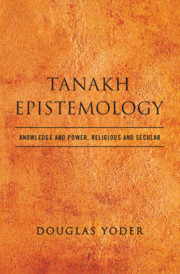
-
Select format
-
- Publisher:
- Cambridge University Press
- Publication date:
- April 2020
- May 2020
- ISBN:
- 9781108653862
- 9781108498609
- Dimensions:
- (228 x 152 mm)
- Weight & Pages:
- 0.72kg, 420 Pages
- Dimensions:
- Weight & Pages:
You may already have access via personal or institutional login
Book description
In this volume, Douglas Yoder uses the tools of modern and postmodern philosophy and biblical criticism to elucidate the epistemology of the Tanakh, the collection of writings that comprise the Hebrew Bible. Despite the conceptual sophistication of the Tanakh, its epistemology has been overlooked in both religious and secular hermeneutics. The concept of revelation, the genre of apocalypse, and critiques of ideology and theory are all found within or derive from epistemic texts of the Tanakh. Yoder examines how philosophers such as Spinoza, Hume, and Kant interacted with such matters. He also explores how the motifs of writing, reading, interpretation, image, and animals, topics that figure prominently in the work of Derrida, Foucault, and Nietzsche, appear also in the Tanakh. An understanding of Tanakh epistemology, he concludes, can lead to new appraisals of religious and secular life throughout the modern world.
Reviews
‘… Yoder’s prose is generally clear and accessible, his explicitly nonlinear approach to his subject matter may challenge nonspecialists.’
J. A. Gauthier Source: Choice
‘… a wide-ranging study of epistemology in the Tanakh … A very challenging and rewarding book.’
Norman S. Wilson Source: Journal for the Study of the Old Testament
Contents
Metrics
Altmetric attention score
Full text views
Full text views help Loading metrics...
Loading metrics...
* Views captured on Cambridge Core between #date#. This data will be updated every 24 hours.
Usage data cannot currently be displayed.
Accessibility standard: Unknown
Why this information is here
This section outlines the accessibility features of this content - including support for screen readers, full keyboard navigation and high-contrast display options. This may not be relevant for you.
Accessibility Information
Accessibility compliance for the PDF of this book is currently unknown and may be updated in the future.


